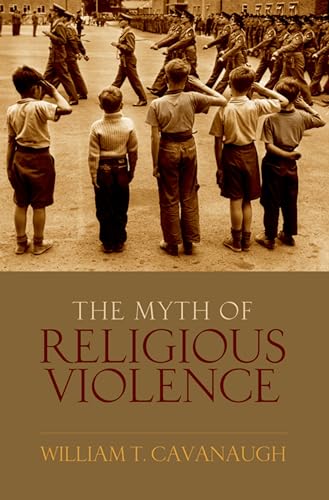The Myth of Religious Violence
Secular Ideology and the Roots of Modern Conflict
William T Cavanaugh
BOOK REVIEW

In a world plagued by conflict and the relentless echo of a violent past, The Myth of Religious Violence: Secular Ideology and the Roots of Modern Conflict by William T. Cavanaugh dares to unravel the most provocative assumptions about the interplay between religion and violence. Cavanaugh challenges the very narrative that has been ingrained in our minds, forcing us to confront the uncomfortable realities of how secular ideologies have fueled modern conflicts, often cloaked in the familiar garb of religious animosity.
From the get-go, this work is not just a book; it's a fierce confrontation with the narratives we've been told. Cavanaugh's sharp wit and compelling arguments slice through the fog of misconceptions. He asserts, with undeniable clarity, that the real conflict lies not merely in religious fervor but rather in the secular ideologies that have weaponized these faiths for political ends. How often have we watched the news, horrified, as politicians use religious rhetoric to justify conflict? Cavanaugh compels us to question the narratives presented to us and to probe deeper into the roots of modern violence.
What makes this work so potent is its historical lens-Cavanaugh meticulously maps the genealogies of violence that often get overlooked in mainstream discourse. He invites readers to see the brutal regimes and nation-states that have wrapped themselves in a cloak of secularism while committing atrocities in the name of progress and modernization. This is a reality that jarred many readers, igniting controversy and debate within academic circles and beyond. "Is Cavanaugh suggesting that secularism embraces violence more than religion does?" is a question rattling through the minds of those who dare to delve into his arguments.
Critical reception of Cavanaugh's book reveals a landscape of mixed opinions. Some praise his audacity, hailing him as a pioneer who bravely pierces the veil of accepted dogmas. Others criticize him for glossing over genuine instances of violence perpetuated under the guise of religion. Yet, this contention only amplifies the resonance of his arguments, encouraging readers to engage in meaningful discourse rather than accepting passive narratives. Those who find the book thoroughly enlightening often note that it has instigated profound shifts in their understanding of religious and secular identities in the context of global conflict.
Cavanaugh artfully draws connections to real-world events, such as the wars in the Middle East, civil strife in Africa, and even domestic turbulence within the United States. He urges us to regard religion not as a catalyst for violence but as a space for potential peace and reconciliation. However, it is the interplay with secular ideologies that truly ignites the discussion. What if the secular state, with its promises of peace and equality, has indeed been a more insidious force in the violence we witness?
As you journey through the pages of this provocative text, prepare for a whirlwind of emotions-ranging from indignation at the misrepresentation of religious communities to a yearning for a more nuanced understanding of human conflict. You won't just read this book; you will wrestle with its implications, questioning your preconceived notions of what leads individuals and groups to violence.
In a society where narratives can shift the tides of public opinion, Cavanaugh's The Myth of Religious Violence stands as a crucial text, redefining what we consider truth and challenging you to engage. The author's ability to interweave personal stories, historical contexts, and stirring rhetoric ensures that you emerge from this reading experience not just informed, but transformed.
Step out of the shadows of ignorance, where simplified narratives reign, and dive into a deep, intellectual ocean that awaits in Cavanaugh's compelling arguments. This book does not merely inform; it demands introspection, proving that the myths we cling to are often far more dangerous than the truths we fear to face. What will you discover in these pages? A challenge to your worldview or a path toward understanding the complexities of human nature? The choice is yours, but the journey through The Myth of Religious Violence promises to be unforgettable.
📖 The Myth of Religious Violence: Secular Ideology and the Roots of Modern Conflict
✍ by William T Cavanaugh
🧾 285 pages
2009
#myth #religious #violence #secular #ideology #roots #modern #conflict #william #cavanaugh #WilliamTCavanaugh